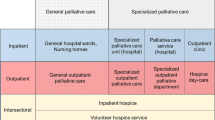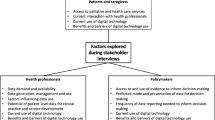Abstract
Purpose
Informal carers may experience a range of unmet needs during the caring period and, at times, lack support to adequately manage care of the person with cancer and balance personal family and work commitments. The aim of this study was to understand the needs of informal carers of people with cancer and how digital technology may be used to address carers’ needs.
Methods
Focus groups and semi-structured interviews were conducted with 45 carers. Carers discussed supports and services they used to address their needs, barriers to accessing support, and how digital technology could assist in meeting their needs.
Results
Carers used informal support such as friends and family and formal support including respite and community groups during the caring period. Barriers to accessing support included reluctance to seek external help, sensitivities associated with prioritising carers’ needs over patients’ needs, and the adequacy of information received. Technology was reported to have the potential to allow carers’ privacy to seek support; however, carers’ attitudes towards technology differed.
Conclusions
Carers require support during the caring period to help balance their own needs with the needs of the person receiving cancer treatment. Digital technology may provide an opportunity to deliver support to carers; however, further research is needed to assess the appropriateness of these interventions to inform improved health outcomes for this vulnerable group.

Similar content being viewed by others
References
World Health Organisation (2017) Cancer. Who Media Centre. http://www.who.int/mediacentre/factsheets/fs297/en/
Australian Institute of Health and Welfare (2017) Cancer in Australia 2017. Canberra
DeSantis CE, Lin CC, Mariotto AB, Siegel RL, Stein KD, Kramer JL, Alteri R, Robbins AS, Jemal A (2014) Cancer treatment and survivorship statistics, 2014. CA Cancer J Clin 64(4):252–271. https://doi.org/10.3322/caac.21235
Hung H-C, Tsai M-C, Chen S-C, Liao C-T, Chen Y-R, Liu J-F (2013) Change and predictors of social support in caregivers of newly diagnosed oral cavity cancer patients during the first 3 months after discharge. Cancer Nurs 36(6):E17–E24. https://doi.org/10.1097/NCC.0b013e31826c79d0
Girgis A, Lambert SD, McElduff P, Bonevski B, Lecathelinais C, Boyes A, Stacey F (2013) Some things change, some things stay the same: a longitudinal analysis of cancer caregivers’ unmet supportive care needs. Psycho-Oncology 22(7):1557–1564. https://doi.org/10.1002/pon.3166
Longacre ML (2013) Cancer caregivers information needs and resource preferences. J Cancer Educ: Off J Am Assoc Cancer Educ 28(2):297–305. https://doi.org/10.1007/s13187-013-0472-2
Ream E, Pedersen VH, Oakley C, Richardson A, Taylor C, Verity R (2013) Informal carers’ experiences and needs when supporting patients through chemotherapy: a mixed method study. Eur J Cancer Care 22(6):797–806. https://doi.org/10.1111/ecc.12083
Badr H, Herbert K, Reckson B, Rainey H, Sallam A, Gupta V (2016) Unmet needs and relationship challenges of head and neck cancer patients and their spouses. J Psychosoc Oncol 34(4):336–346. https://doi.org/10.1080/07347332.2016.1195901
Hashemi M, Irajpour A, Taleghani F (2018) Caregivers needing care: the unmet needs of the family caregivers of end-of-life cancer patients. Support Care Cancer 26(3):759–766. https://doi.org/10.1007/s00520-017-3886-2
Janda M, Steginga S, Dunn J, Langbecker D, Walker D, Eakin E (2008) Unmet supportive care needs and interest in services among patients with a brain tumour and their carers. Patient Educ Couns 71(2):251–258. https://doi.org/10.1016/j.pec.2008.01.020
Longacre M, Galloway T, Parvanta C, Fang C, Longacre ML, Galloway TJ, Parvanta CF, Fang CY (2015) Medical communication-related informational need and resource preferences among family caregivers for head and neck cancer patients. J Cancer Educ 30(4):786–791. https://doi.org/10.1007/s13187-015-0814-3
Chi NC, Demiris G (2015) A systematic review of telehealth tools and interventions to support family caregivers. J Telemed Telecare 21(1):37–44. https://doi.org/10.1177/1357633x14562734
Colorafi KJ, Evans B (2016) Qualitative descriptive methods in health science research. HERD 9(4):16–25. https://doi.org/10.1177/1937586715614171
Dębska G, Pasek M, Wojtyna EWA (2017) Does anybody support the supporters? Social support in the cancer patient-caregiver dyad. Fam Med Prim Care Rev 19(2):110–113. https://doi.org/10.5114/fmpcr.2017.67863
Olson R, Connor J (2015) When they don’t die: prognosis ambiguity, role conflict and emotion work in cancer caregiving. J Sociol 51(4):857–871. https://doi.org/10.1177/1440783314544996
Spillers RL, Wellisch DK, Kim Y, Matthews BA, Baker F (2008) Family caregivers and guilt in the context of cancer care. Psychosomat: J Consult Liaison Psychiatry 49(6):511–519. https://doi.org/10.1176/appi.psy.49.6.511
Buscemi V, Font A, Viladricht C (2010) Focus on relationship between the caregivers unmet needs and other caregiving outcomes in cancer palliative care. Psicooncología 7(1):109–125
Boltong A, Byrnes M, McKiernan S, Quin N, Chapman K (2015) Exploring the preferences, perceptions and satisfaction of people seeking cancer information and support: implications for the cancer council helpline. Aus J Cancer Nurs 16(1):20–30
Badr H, Carmack CL, Diefenbach MA (2015) Psychosocial interventions for patients and caregivers in the age of new communication technologies: opportunities and challenges in cancer care. J Health Commun 20(3):328–342. https://doi.org/10.1080/10810730.2014.965369
Foster C, Myall M, Scott I, Sayers M, Brindle L, Cotterell P, Addington-Hall J, Hopkinson J, Payne S, Robinson J (2015) ‘You can’t say, ‘what about me?’ I’m not the one with cancer’: information and support needs of relatives. Psycho-Oncology 24(6):705–711. https://doi.org/10.1002/pon.3716
Olson R (2014) A time-sovereignty approach to understanding carers of cancer patients’ experiences and support preferences. Eur J Cancer Care 23(2):239–248. https://doi.org/10.1111/ecc.12121
Australian Medical Association (2016) Stop the cuts - time for strong investment in health. Australian Medical Association. https://ama.com.au/media/stop-cuts-time-strong-investment-health. Accessed 27.11.17
Heynsbergh N, Heckel L, Botti M, Livingston PM (2018) Feasibility, useability and acceptability of technology-based interventions for informal cancer carers: a systematic review. BMC Cancer 18(1):244. https://doi.org/10.1186/s12885-018-4160-9
Funding
This research was supported by scholarships from the School of Nursing and Midwifery, Deakin University, and Eastern Health Foundation.
Author information
Authors and Affiliations
Corresponding author
Ethics declarations
Ethical approval
All procedures performed in studies involving human participants were in accordance with the ethical standards of the institutional and/or national research committee and with the 1964 Helsinki declaration and its later amendments or comparable ethical standards.
Rights and permissions
About this article
Cite this article
Heynsbergh, N., Botti, M., Heckel, L. et al. Caring for the person with cancer and the role of digital technology in supporting carers. Support Care Cancer 27, 2203–2209 (2019). https://doi.org/10.1007/s00520-018-4503-8
Received:
Accepted:
Published:
Issue Date:
DOI: https://doi.org/10.1007/s00520-018-4503-8




